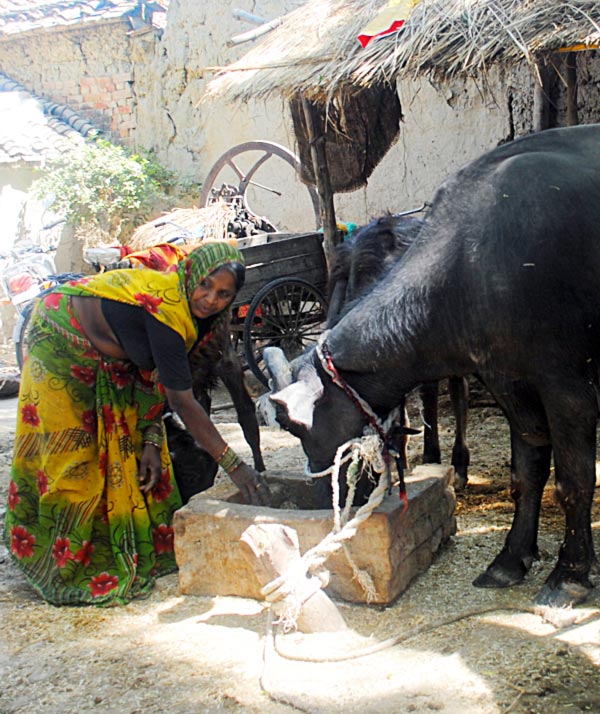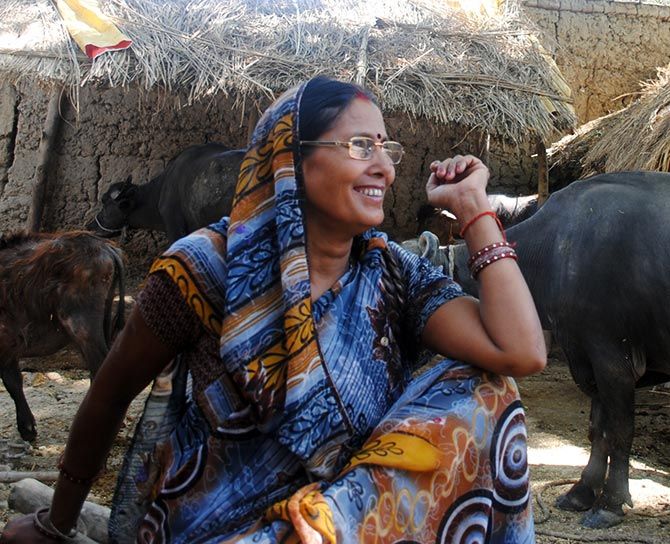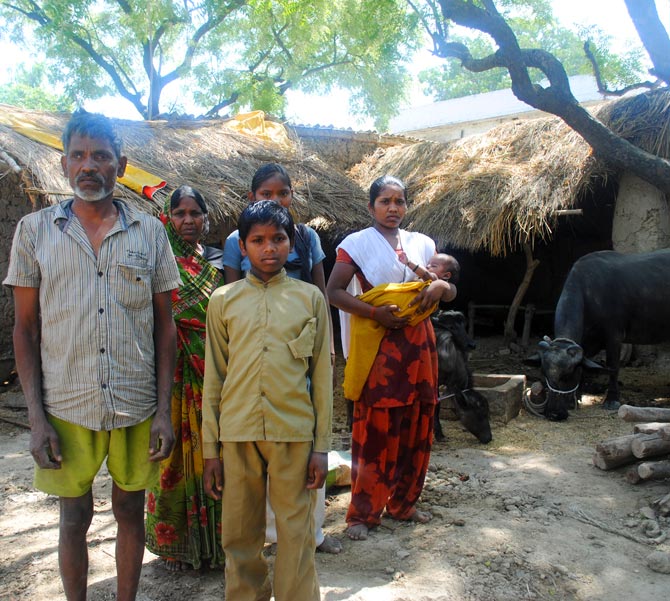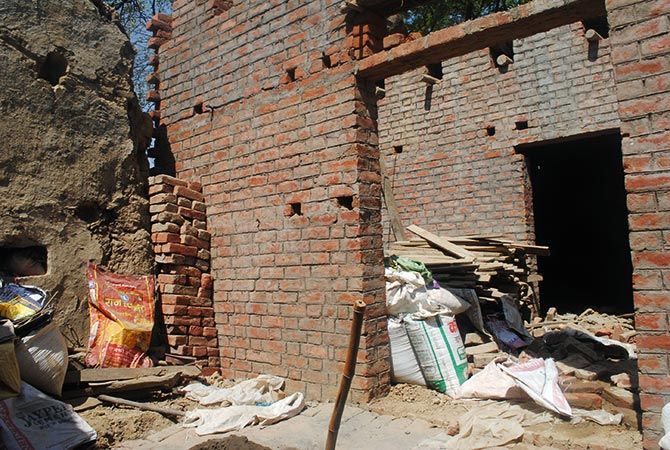 | « Back to article | Print this article |
Why Amethi's 10,000 women will vote for Rahul
While grinding poverty in Amethi remains, the Rajiv Gandhi Mahila Vikas Pariyojna, an umbrella body of 1,200 self-help groups, has helped several women feed their impoverished families. Swarupa Dutt/Rediff.com reports.
On April 1, Bharatiya Janata Party candidate Varun Gandhi addressed a group of teachers at his constituency in Sultanpur, saying his cousin Rahul Gandhi was doing good work through his self-help groups for improving the lot of women and that he would like to follow it up in his constituency.
After a sharp rap on the knuckles from his party, Varun backtracked and said his comments were based on hearsay and was not an endorsement of any political party or a candidate.
Across the length and breadth of Amethi disenchantment with Rahul Gandhi is unanimous. Despite Amethi's VVIP status, people say there has been little development.
But equally unanimous is the grudging acknowledgement of the success of the Swayam Sahyata Samuh (self-help group) movement started in 2002, that has made over 10,000 poor, rural, women in Amethi self-reliant.
In the village of Kasthuni Purab in the Musafirkhana Tehsil of Amethi, we meet Savitridevi, a member of the Santoshimata Swayam Sahayata Samuh. With a Rs 30,000 loan from the Samuh, she bought a buffalo, after her husband was diagnosed with a kidney disease. She is the sole earning member in her family of 6.
Please click NEXT to read more...
'I have earned respect, I am self-reliant...'
Grinding poverty remains, but it is only because of the Rajiv Gandhi Mahila Vikas Pariyojna, the umbrella body of the 1,200 samuhs in Amethi, that Savitridevi has been able to keep her family alive.
"Humein samman mila hai, hum atmanirbhar hain, yeh hamare liye bahut badi baat hain (I have earned respect, I am self-reliant and that is a very big matter for us)."
It is also why she and her husband will vote for the panja (the Congress's electoral symbol) on May 7 when the constituency goes to vote.
Savitridevi and her husband Lachman are desperate to meet Rahul Gandhi. "I heard he came to Jagdishpur (one of the 5 assembly constituencies in Amethi, 21 km away), but I couldn't go for the rally," says Lachman.
Lachman needs Rs 10,000 to get his daughter Rashmi, 21, married. Rahul is a family member, just as they are a part of Rahul's family, he says. "We will be grateful to him throughout our life if he gives us the money," he says and begs us to relay the message to Rahul. "I know he will not refuse," Lachman says confidently.
The couple have four children, the youngest, a girl, is 4 months old. Then there are 3 school-going children, ages 7 to 14.
Please click NEXT to read more...
'We would have died of hunger had it not been for Rajiv and Rahul'
Lachman doesn't own land, neither can he do what other landless Dalits do -- manual labour -- because he has only one working kidney. He keeps indifferent health and has to still pay off a Rs 2,000 loan from generous villagers, not just Dalits, but upper castes as well, for the medicines.
There is no water, no toilet, no electricity, and he lives in a kachcha (mud wall, thatch-roof) house -- over 50 per cent of the village, which has 300 people on the voters list -- live in similar conditions.
The only source of income for this family is a buffalo, which Savitri owns.
The buffalo, which costs Rs 30,000, was bought with a loan facilitated by a self-help group that works under the Rajiv Gandhi Mahila Vikas Pariyojana. "Agar Rajivji, Rahulji na hote, hum bhoonko mar jate (We would have died of hunger had it not been for Rajiv and Rahul)," says Savitridevi, who has almost repaid the loan. "I have to pay Rs 4,000 and then she (the buffalo) will be mine," she says with pride.
Saroj Tiwari, 45, a Suvidha Daata (a group leader) with the Santoshimata Swayam Sahayata Samuh (self-help group), got Savitri the loan. "They may be poor, but let me tell you, she has never defaulted on her payments. I know that she will pay off the loan within a couple of months," she says, patting Savitridevi on the back. The interest rate under the scheme is 10 per cent per annum, and according to a report, more than 90 per cent repay their loans.
Tiwari's self-help group has 1,500 women members, who own buffalos, grow vegetables or work with tailoring (women's sari blouses, petticoats) projects. Women who own buffalos like Savitridevi sell the milk to local milkmen. Tiwari gets paid around Rs 10,000 a month and along with 3 suvidha daatas, motivates women to join the samuh, liaises with banks for loans for members, oversees the running of the samuh and holds meetings every few days.
In Amethi alone, over 10,000 women have benefitted from the samuh programme.
Savitri's buffalo gives 5 litres of milk every day, which she sells to the local milkman at Rs 25 per litre. There is another adult buffalo, which was given to her daughter, Rashmi, in lieu of payment for threshing wheat for a Thakur family in the village.
"She worked for the family during the harvest season and they gave her a small share of the wheat and that buffalo, instead of money. Since a buffalo costs a minimum of Rs 30,000, we thought it was a good deal, but in a few days we realised that the buffalo doesn't give milk. They cheated us, what could we do?" shrugs Lachman.
After paying for animal feed, the family is left with Rs 25 per day for a family of six. The Planning Commission puts the poverty line at Rs 29 per person per day.
Please click NEXT to read more...
'Rahul Gandhi could have done so much more, but he didn't'
Savitridevi takes the cleaned plate of rice from her daughter and says, "Don't ask us how we manage to live on Rs 25 a day, I don't know. But once the calves give milk, our income will go up. Bas, bitiya ka byaah ho jaaye (All I want is for my daughter to get married)."
The two younger children go to a government-run primary school in the village, which has 3 teachers and around 200 students. Funds for the midday meal stopped a few months ago, says the principal. There is a vacancy for 2 teachers since 3 years, he adds.
The primary health centre building was built over 20 years ago when Rajiv Gandhi was the MP from Amethi, but it was never completed. "We have a makeshift primary health centre that runs from a temple, but it offers only basic treatment. The medical officer comes twice a week," says Ajay Kumar Singh, an LIC agent, who lives in a pucca house that has a toilet.
"Rahul Gandhi could have done so much more, but he didn't; I will vote for the BJP," he says.
In Savitridevi's home, Rashmi whispers, eyes downcast, "I'm a burden to my parents. I don't want to get married, but if I do, at least they will have fewer mouths to feed."
Rashmi gave up on her dreams of being a doctor many years ago; her father did not have the money to continue her education beyond Class 5. "We don't have to pay school fees, but by staying home, I could earn some money by working in people's fields," she says.
Right behind their home lies their future -- a pucca house is being built by funds from the Indira Awas Yojna. The government provides financial assistance for construction of houses to the poor. The houses are allotted in the name of the woman.
Lachman is building it himself to cut labour costs. He wants to complete the work before the rains begin. In a storm, in August last year, their roof was blown away.
"For 3 days we lay soaking wet in the rain till the rain stopped and we could build a roof again," says Lachman, tugging at his torn shirt sleeve. "And I'm building a toilet too," he says proudly.



